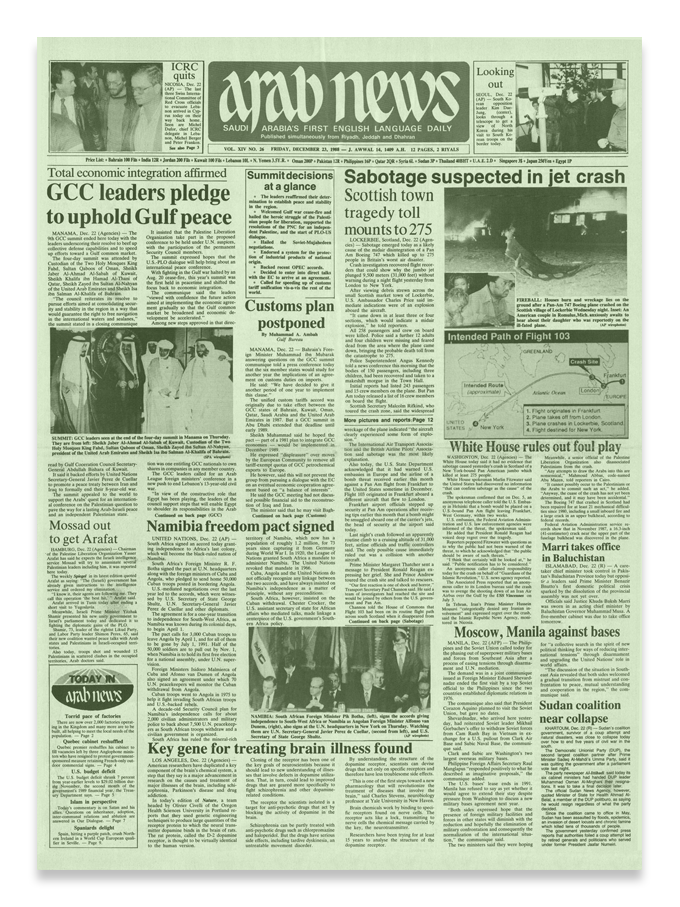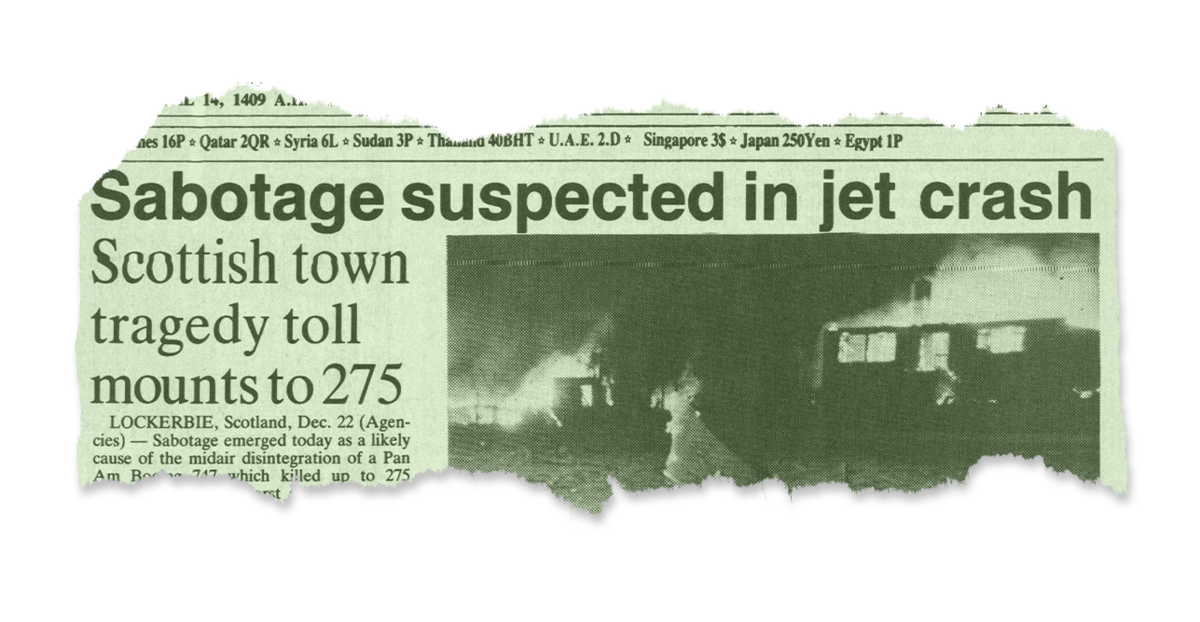The truth about the deadliest terror attack in UK history may never be known
Summary
On Dec. 21, 1988 Pan-Am Flight 103, en route from Frankfurt, via London, to New York, crashed on the Scottish town of Lockerbie, killing all 259 passengers and crew. Eleven residents in a single street in Lockerbie also died when part of the wreckage fell on the town.
Crash investigators quickly found traces of high explosives, triggering a forensic investigation that the aircraft had been downed by a bomb concealed inside a cassette player in a suitcase in the aircraft’s hold.
In November 1991, two alleged Libyan intelligence officers, Abdelbaset Al-Megrahi and Lamin Khalifa Fhimah, were indicted for the bombing. For nine years Libyan leader Colonel Muammar Qaddafi refused to allow their extradition, but under pressure from international sanctions finally agreed to allow them to face trial for murder under Scots law in a special court in The Netherlands.
Fhimah was found not guilty but Al-Megrahi was sentenced to life imprisonment. Diagnosed with prostate cancer, he was released on compassionate grounds after serving a little over eight years of his sentence. He returned to a hero’s welcome in Libya, where he died almost three years later.
JEDDAH: The king leads the Saudi delegation at a GCC summit in Manama, there is a new government in Israel, and there is a crisis in Sudan; that Arab News front page could have been published almost any day this year.
Except the Saudi king was King Fahd, the Israeli prime minister was Yitzhak Shamir, and another report on the page tells you this not 2020, but Dec. 23, 1988. Two nights before, Pan Am Flight 103 from Frankfurt to Detroit via London and New York had been blown up by a terrorist bomb as it crossed the border between England and Scotland.
With a death toll of 270 — all 243 passengers and 16 crew, and 11 victims on the ground in Lockerbie, where the aircraft smashed into two residential streets at 800kph— it remains the deadliest terror attack in UK history.
Few events resonate all the way from a small Scottish border town to the White House. This was one such event. Lockerbie, with its 4,000 souls, joined that list of places in the UK and elsewhere — Aberfan, Munich, Srebrenica, My Lai — forever associated in the public consciousness with cruel and senseless loss of life.
Scotland, my country, and Glasgow, my city, are not soft places, nor are the journalists they produce noted for emotional incontinence. But I saw tough, cynical, diamond-hard reporters return from Lockerbie numbed into glazed-eyed silence by the enormity of what they saw there, and full of respect and admiration for the quiet dignity and fortitude with which its townspeople bore their losses.
Most of the plane’s passengers were American, and their relatives flew from the US to identify bodies and possessions. The people of Lockerbie temporarily buried their own grief to provide accommodation, food, comfort and solace to the bereaved. Bonds were forged that remain to this day.

A page from the Arab News archive showing the news on Dec. 23, 1988.
When a terrorist attack was confirmed, the perpetrator identified by Washington was inevitable. The US and the regime of Muammar Qaddafi in Libya had been in a state of undeclared war for years, and US airstrikes in April 1986, far from cowing Qaddafi, appeared only to have incensed him.
US and UK investigators believe Libyan agents in Malta concealed a Semtex bomb inside a radio-cassette player and sent it in a suitcase to Frankfurt, where it was loaded aboard Pan Am Flight 103 and the fate of 270 people was sealed.
Key Dates
-
1
The US Federal Aviation Authority issues a bulletin warning of an anonymous tip that a Pan Am flight from Frankfurt will be blown up in the next two weeks.
-
2
Pan Am Flight 103 is destroyed by a bomb over Lockerbie.
-
3
Alleged Libyan intelligence officers Abdelbaset Al-Megrahi and Lamin Khalifa Fhimah are indicted for murder by US and Scottish authorities, but Libyan leader Muammar Qaddafi refuses to allow their extradition for trial.

-
4
After a nine-year standoff, Qaddafi agrees to allow Al-Megrahi and Fhimah to be tried under Scottish law in the Netherlands.
-
5
Al-Megrahi is jailed for life. Fhimah is found not guilty.
-
6
Al-Megrahi loses an appeal against his conviction.

-
7
Qaddafi accepts Libya’s responsibility for the bombing and agrees to pay compensation to each of the victims’ families.
-
8
Al-Megrahi, with terminal prostate cancer diagnosed, is released on compassionate grounds and returns to Libya.
-
9
Libyan civil war breaks out.
-
10
Libya’s former Justice Minister Mustafa Abdul Jalil claims Qaddafi’s regime was implicated in the bombing.
-
11
Qaddafi is killed by rebel militia while trying to flee after the fall of Tripoli.
-
12
Al-Megrahi dies, aged 60.
With some narratives, paradoxically, it can make sense to work backwards — from when Abdelbaset Al-Megrahi, a Libyan intelligence officer and former head of security for Libyan Arab Airlines, died at his home in Tripoli on May 20, 2012, at the age of 60.
More than 11 years earlier, in January 2001, three Scottish judges sitting at a special court in a former US air base in the Netherlands had sentenced Al-Megrahi to life imprisonment on 270 counts of murder for the Lockerbie bombing. He served more than eight years in two prisons in Scotland before the Scottish government released him on compassionate grounds when doctors said he had terminal cancer, and he returned to Libya in August 2009. Given three months to live, he lasted for nearly three years.
Al-Megrahi was, and remains, the only person to be convicted of the bombing of Pan Am Flight 103; with his death, therefore, case closed? Well, no.
The repercussions began soon after the disaster, and continue to this day. Pan Am, its security operations exposed as criminally useless, was bankrupt after a year and out of business after two. UN sanctions against Qaddafi and Libya reinforced their pariah status, and the country remains a failed state embroiled in civil conflict. For the rest of us, airline and airport security have intensified on an apparently endless upward trajectory, and we can at least be grateful that an unaccompanied suitcase with a bomb inside can never again travel from Malta through two airports to the skies over Scotland.

“The Town Hall, decorated with festival lights and now hastily converted into a mortuary, was besieged by distraught relatives.”
From a Reuters story in Arab News, Dec. 23, 1988
Perhaps most significantly, however, Lockerbie may have marked the beginning of a collapse in public trust in what our governments tell us. Authorities in the US and the UK insist that Al-Megrahi was guilty, and that he acted alone or with a single accomplice. Few believe that.
Major world events — the assassination of John F. Kennedy, the moon landings, the 9/11 attacks on America — attract conspiracy theorists like iron to a magnet, and Lockerbie is no exception. It was Iran; it was the Palestinians; it was Mossad; it was the Stasi; it was apartheid South Africa.
What makes Lockerbie different is that one of the “theories” is almost certainly fact — which one, is anyone’s guess. One man more entitled that most to guess is Jim Swire, the softly spoken but determined English country doctor whose daughter Flora, 23, perished on board the plane. Swire, now in his eighties, has devoted his life to finding the truth about Lockerbie. He met and questioned Al-Megrahi. He met and questioned Qaddafi. He has been a thorn in the side of UK and US authorities for more than 30 years, and he believes to this day that the case against Al-Megrahi was a travesty and a tissue of lies, to cover up some ghastly truth that may never be known.
US President George H. W. Bush set up an aviation security commission in September 1989 to report on the plane’s sabotage, and British relatives of the victims met members of the commission at the US Embassy in London in February the following year. A member of Bush’s staff told one of the relatives: “Your government and ours know exactly what happened, but they are never going to tell.”
And that, surely, for the victims of Pan Am Flight 103, for their still grieving families, and for the people of Lockerbie, was the final insult.
- Ross Anderson, associate editor at Arab News, was on duty as a senior editor at Today newspaper in London on the night of the Lockerbie disaster
























